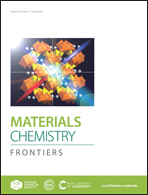Regulating Li nucleation/deposition by bamboo-shoot like lithiophilic particles anchored on carbon cloth for a dendrite-free lithium metal anode†
Abstract
The extended application of lithium (Li) anodes is restricted by volume change and Li dendrites. The addition of a “host” structure and regulation of Li deposition/dissolution behavior can significantly enhance the electrochemical performance of Li anodes. Herein, bamboo-shoot like particles of a highly lithiophilic Li22Sn5 intermetallic compound are successfully anchored on the light and flexible carbon cloth (CC) host to accommodate Li via facile thermal infusion of the molten Li-rich Li–Sn alloy. The affinity between Sn and carbon affects the phase separation behavior while the molten Li–Sn alloy is cooled down, resulting in exclusive solidification of Li22Sn5 into micro-sized particles on the carbon fibres. The strong interaction between Li22Sn5 sites and Li allows uniform Li deposition and suppresses the formation of Li dendrites in the CC host matrix, although the initial electrochemical process is Li deposition or Li dissolution. Consequently, the electrochemical performance is greatly improved, in which the symmetric cell can be stably cycled for 3500 h at 1 mA cm−2 and 1 mA h cm−2 in the ester-based electrolyte, and the LiFePO4 full cell delivers a high specific capacity of 128.6 mA h g−1 even at an increased current rate of 2C, representing a significant advance in the pursuit of practical Li metal batteries.



 Please wait while we load your content...
Please wait while we load your content...